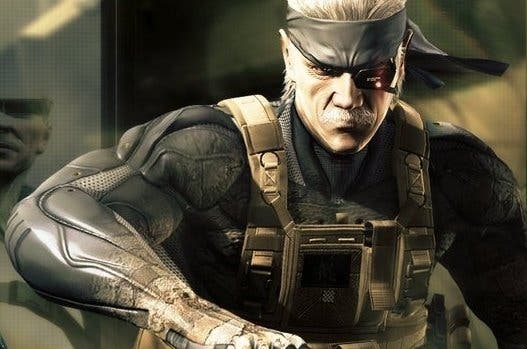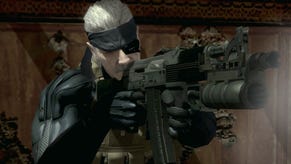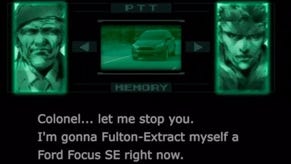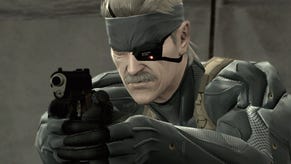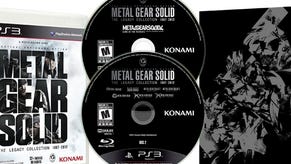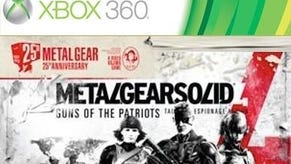Metal Gear Solid 4: Guns of the Patriots review
From the archive: Going out with a bang.
Editor Oli Welsh writes: On the eve of Metal Gear Solid 5's release, we thought it would be fun to revisit my review of MGS4, one of our more controversial at the time (back when we did scores). In May 2008 I was only a few months into employment with Eurogamer and honestly had no idea that what I thought of as an affectionately sceptical review would be met with over 2000 furious comments and some pretty colourful personal feedback. Looking back on it now, the closing kiss-off was perhaps a provocation too far, but I stand by the rest of it - and I've been delighted to see Snake and Kojima prove me wrong by moving with the times, while preserving the games' unique flavour, in Ground Zeroes and The Phantom Pain.
Metal Gear Solid has always been a love it or hate it proposition. Millions love it for its involved, conspiratorial plotting, its arch sense of humour, its demanding stealth gameplay, its sprawling cinematic ambition, its preposterous stylishness and pretensions toward artistic weight. Millions hate it for exactly the same reasons.
Then there are those - this reviewer included - for whom Metal Gear Solid is a love it and hate it proposition. Flawed, intractable, unspeakably tedious at times, and yet blessed with incredible production values, imaginative design, and a brilliant, brave willingness to think and do the unexpected and impossible. At times they're barely videogames at all, but they're capable of moments of pure videogame genius, joy and shock that few other series can match.
So how do you review a new Metal Gear Solid? Do you assess it on its own terms, ones that its legion of fans will understand? Do you play the sceptic, and take Hideo Kojima and his team to task for their stubborn refusal to catch up with what the rest of the world expects of a videogame? Or do you walk the path of compromise, down the middle?
Well, if there's one thing Metal Gear Solid 4 isn't, it's compromising. Kojima has barred no holds in an extraordinary, kitchen-sink finale to the Solid Snake story. Plausibility is stretched to extremes as every character you can think of (and several you never would) makes a cameo appearance in this melancholy epic. Features that would be a tent-pole selling-point for other games are frittered away as Easter eggs and one-shot surprises. Such is the luxurious length and mind-numbing detail of the cut-scenes and codec conversations that you could put the pad down for almost half the game's ample length. (One character actually asks you to do so at one point, resulting in a typically self-aware and genuinely hilarious joke.)
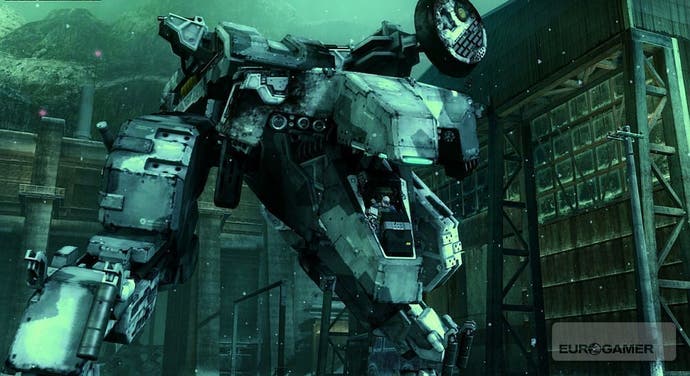
There's almost too much going on. With a see-sawing episodic rhythm that visits some starkly different locations and play styles, a wealth of incidental and hidden detail, more gameplay mechanics than you can fully explore in a single playthrough - and above all, an epic, elegiac, arcane storyline that seeks to tie up every last loose thread and honour the passing of a classic videogame hero - Metal Gear Solid 4 is, in most senses, the biggest Metal Gear yet. But the best? Maybe not. If the super-slick thriller of the first Metal Gear Solid remains Kojima's masterpiece, then this operatic monster is his magnum opus.
Guns of the Patriots tells the story of Old Snake, the prematurely ageing, terminally ill and newly moustachioed covert agent, as he hunts down his genetically-engineered twin brother and nemesis, Liquid Snake (now inhabiting the body of Revolver Ocelot, of course, but we must gloss over such details or we'll still be here next week). Liquid is attempting to subvert and destroy the ruling Patriot conspiracy and bring the world - currently overrun with mood-controlled private armies fighting meaningless wars in the name of the war economy - into chaos.
Even keen students of Metal Gear lore are going to struggle to follow this tangled tale. Laden with sentimental sermons and metaphors for the evils of war, struggling under the weight of resolving the plots of four previous games and the personal destinies of characters as diverse as Raiden, Meryl, Naomi, Vamp and Eva, it is in all honesty a mess. Motivation and consistency fall by the wayside and by the end it's totally unclear who is on which side, or what's at stake. Maybe that's deliberate, but it doesn't work, and the hours of talking-head exposition involved are too steep a price to pay for this muddled closure.
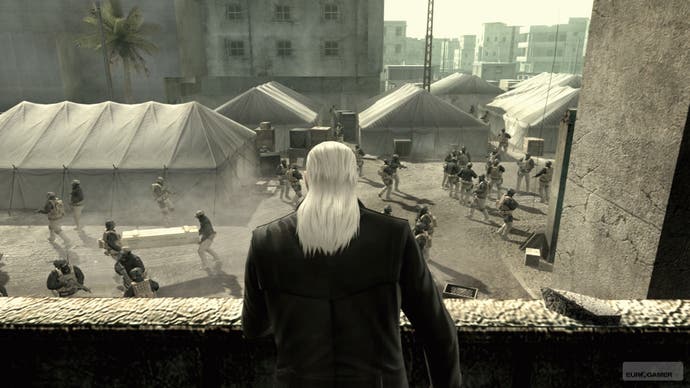
But that's just the plot. There's another side to this story, and it's the one told by the game's locations, action and dramatic high-points - and in some cases, by moments between its handsome, expressive and earnestly-voiced cast of virtual actors. This story is, by contrast, a richly satisfying success. Tune out the details, and Guns of the Patriots is a properly gripping yarn, full of thrills, spectacle, laughs, and even tenderness and pathos. You won't understand, but you will care.
Design-wise, MGS4 is mostly a refinement of what's gone before. The new gadgets are superb, the weapons are expertly realised and much easier to get hold of, and there are always plenty of options, even if stealth is still usually the best of them. Hand-to-hand combat feels more natural. The environments are more complex, but nothing like as large or open as you might expect, and this is still a linear game.
Only the new Stress and Psyche meters don't really gel with the flow of play; we suspect they come into their own in the highest difficulty settings, but at that level, Metal Gear Solid 4 is an exercise in teeth-grinding masochism for specialists only. Metal Gear Solid has always been either too easy or too hard, and too possible to get through by sloppy cheating or simple attrition, and that hasn't changed.
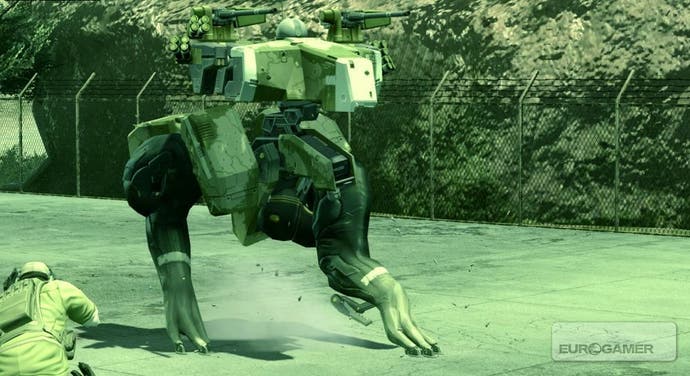
The first act is a tense infiltration of a war-torn Middle Eastern city, terrorised by the creepy Gekko biomechs and Liquid's personal guard, the sinister Frogs. The new enemies are great fun to gun down and outwit, and the sense of being part of a live battle-zone with several factions in play - as opposed to playing lone wolf against the guards - adds terrific atmosphere to the Metal Gear experience, even if it doesn't exactly revolutionise it.
It's everything you've seen, heard about and expected from Metal Gear Solid 4. The relatively weak second act is more of the same in a much less compelling setting - a rather unconvincing, blandly designed South American backwater - and ennui starts to set in. This is a much more accessible game to play than the convoluted MGS3, with the OctoCamo suit and Metal Gear Mk II remote drone taking much of the pain out of stealth, while weapons trading and customisation, and the excellent new cameras, do the same for gunplay. A good thing, certainly, but it lays the decade-old gameplay systems bare, with only modest improvements in AI to make up for it.
Halfway through this section, a novel gameplay idea, a rousing on-rails shoot-out, and some thunderous cut-scene entertainment succeed in sustaining interest until the next episode. It's at this point that Kojima pulls the rug from under your feet. The MGS4 you were expecting, it turns out, is no more than half of the game you get.
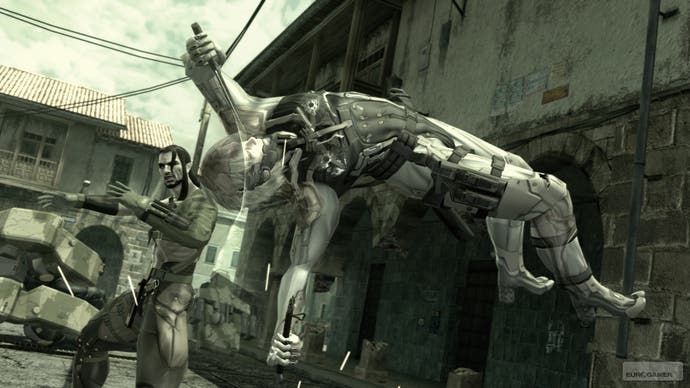
We're not going to explain how, because everything that follows deserves not to be spoiled - not the plot, but the string of ideas that break Metal Gear Solid down and rebuild it, in several brilliant and surprising ways, before the game is done. The first of these is such a precise and enthralling distillation and of stealth gaming that it's a shame more people won't see it, but it's worth saving for the way it takes you unawares. Each time, atmospherics, graphics, tone and gameplay revisions mesh perfectly down to the tiniest detail, as Kojima Productions bombards you with references and mood-swings that leave your head in a spin. 1940s 'noir' cinema, the Iraq war, beat-'em-ups, Halo... take your pick.
You expect the boss battles to take a starring role in Metal Gear Solid, and the encounters with the Beauty and the Beast team of psychotic femmes fatales in robot animal suits don't disappoint - how could they? All different, all very well-staged, all with a slightly disturbing and mournful edge. But in this case it's actually the early parts of the game's chapters that leave your jaw hanging open with their audacity and invention; it's the Gekko confrontations that strike fear into your heart; it's the visually staggering on-rails set-pieces that provide the biggest bang per buck.
Despite Kojima's downbeat sentiments on the PS3, he has produced a technical and presentational tour-de-force. The visuals do have rough edges but the art, especially the character art, is flawless, somehow maintaining extravagance and understated cool simultaneously. Harry Gregson Williams' music, whether providing scripted excitement or dynamic accompaniment, hits all the right cues, and musters a memorable, delicate theme. And the surround soundtrack is clearly a labour of love and extreme dedication, probably the best in gaming to date, lacking nothing in either pin-sharp precision or rib-shaking impact.
(Take note, however, that there are several minutes of install time to be endured, not just at the start, but before each act - albeit graced with a fantastic animated graphic of Snake smoking next to some health warnings.)
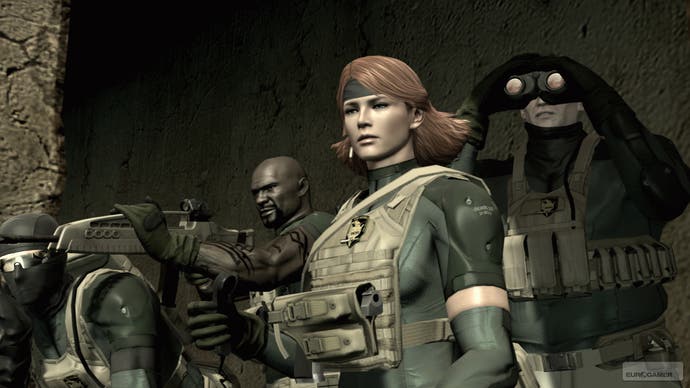
It won't ease the pain of the cut-scene haters one bit, but the interactive elements to the in-engine cinematics are hugely impressive nonetheless, and do much to paper over the cracks and make MGS4 feel a little more like a whole and less like a split-personality hybrid of movie and game. You would certainly skip the interminable mission briefings if it weren't for the ability to explore Otacon's flying headquarters via Metal Gear Mk II and CCTV while the talk rumbles on; the flashbacks and camera changes add less than you'd think, but the sense that cut-scenes and gameplay are taking place in the same world, heightened by some gorgeous camera transitions, adds a whole lot more.
There are even split-screen sections that provide simultaneous feeds of game and movie. In Guns of the Patriots' incredible, cathartic, climactic scenes, the lines are blurred so much that you can barely tell whether you're playing a videogame or watching a film. To some that might sound like an insult, but to Kojima and his fans, it's nirvana, something for which the series has been striving for ten years, and it could not be a more appropriate note to end on.
If only MGS4 did end there. An unbelievably lengthy and self-indulgent epilogue - you can't call it a cut-scene, it's an entire film in its own right, and a deeply boring one too - is how Solid Snake's career comes to a close. Too bad, but no hard feelings; you can ignore it if you wish. The drawn-out sentimentality is fitting, in a way. Snake may have started out as a gruff, two-dimensional cliché, but he bows out very gracefully in Metal Gear Solid 4, assuming the mantle of the world-weary samurai, or the enigmatic nameless cowboy from a spaghetti western, as if it were always his. David Hayter's voice performance isn't much more than an attempt to create the gravelliest, throatiest croak ever recorded by man, but as such, it's heroic.
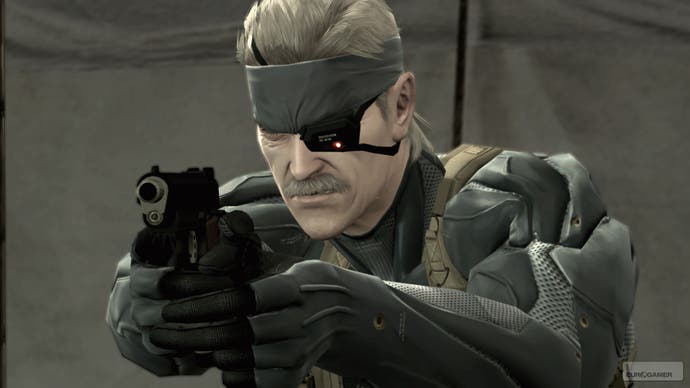
You're sorry to see Snake go. But should you be? Guns of the Patriots is a frustrating, fractured game that turns Metal Gear Solid's world upside down several times over, but never changes it. It just burrows deeper into what fans love and detractors hate than ever before, and it will make few converts. It's a crying shame, given how many genuinely classic gaming moments there are here, given the countless exquisite creative touches, but Metal Gear Solid 4 is its own worst enemy. You could not ask for a funnier, cleverer, more ambitious or inspired or over-the-top conclusion to the Metal Gear Solid series, but it's definitely time to move on.
We love you, Snake. Don't come back.
